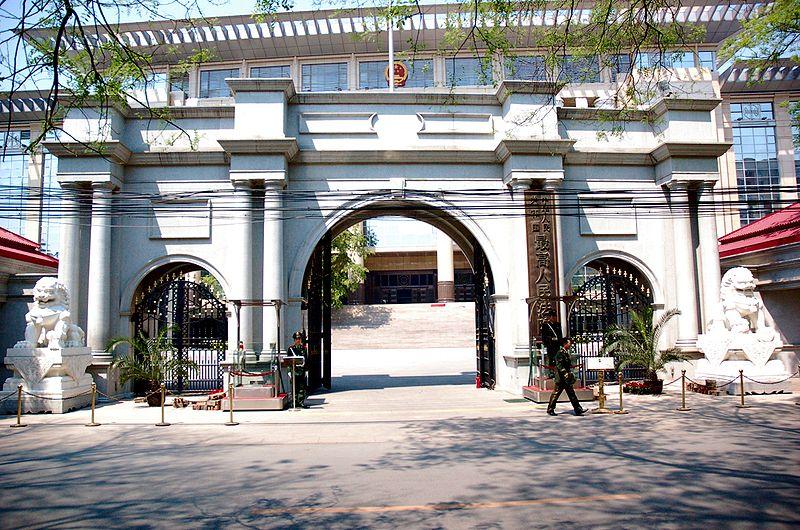China issues new regulation requiring lawyers to swear allegiance to Communist Party
Attorneys who want a license to practice law in China will have to swear allegiance to the Chinese Communist Party. Pictured is the The main entrance to the Supreme People’s Court of the People’s Republic of China. (Photo by Rneches via Wikimedi
China’s Ministry of Justice announced this week that new Chinese lawyers need to take a pledge of loyalty to the Communist Party, if they want to get their license to practice.
This new rule comes in the tense lead-up to a leadership transition, with Chinaese online communities buzzing with rumors of fierce infighting among China’s political elite.
The pledge Chinese lawyers are now supposed to take includes promising “to be faithful to the Motherland and the people, and to uphold the leadership of the Chinese Communist Party and socialist system.”
Lawyer Mo Shaoping, who’s known for taking on sensitive human rights cases many other lawyers won’t touch said that requirement goes against the country’s constitution.
“A lawyer is supposed to be loyal to the law, and to the country, not to a single political party,” he said.
But in China, the Communist Party has made sure that the line between party, country, law and government is more of a blur than a deep demarkation in the sand.
“Lawyers are not independent in the first place,” said Nicholas Bequelin, the Hong Kong-based China researcher for Human Rights Watch.
He said they’re statutorily under the control of the Ministry of Justice. They’re also under the control of the government-controlled Lawyers Association and many are already party members.
“So I don’t think this announcement makes a big difference.” Bequelin said. “On the other hand, it is interesting to see that the government is ready to dispense with the fiction that it actually doesn’t play a direct role in the administration of justice. The façade it usually likes to put up is abandoned.”
This comes at a moment when the Party seems to be tightening on multiple fronts. A once-per-decade leadership transition is looming, and the word from on high is that both the judiciary and the media should serve the party – not the government, not the country. The Communist Party.
“The problem with the requirements for lawyers to abide by party discipline is what the party considers to be in its interests is what goes against people’s interests,” Bequelin said. “And if they try to go against the government, to have their rights respected, because they’ve been violated by some government official, the party will define it as being a challenge that needs to be suppressed in the name of maintaining social stability.”
The party already views many civil rights lawyers as acting against the interests of the party. Last year, several were detained, tortured and threatened before being released. A couple who used to be outspoken about the need for an independent judiciary and other political reforms, declined to talk about the new oath. They said they’re still under too much pressure.
Mo has made a career of taking on sensitive human rights cases, but knowing when to step back to avoid the same fate. Now, faced with the requirement to take a vow of loyalty to the party, Mo can only shrug.
“Look, I disagree with it,” he said. “But in the end, this is one regulation, from one department. It’s not a law. They’ve said things like this in the past, and I’ve just kept going. And that’s what I’ll do now.”
Mo said it’s not surprising to him the party is trying to control risks before the leadership transition this fall. One of the men long expected to step into a top slot has been relieved of his post and is under investigation – that’s Bo Xilai, former party chief of Chongqing. The party wants to make sure it can count on the courts, the judges and the lawyers to find guilty those whom the party considers a problem. And to leave alone those the party wants left alone.
That’s more or less worked until now. But the economy is slowing and social tensions are rising. With half a billion Chinese online sharing grievances and rumors – lots of rumors, since Bo was sacked – the Party may discover that a legal system that serves the Party over the people is like a pressure cooker, with no release valve.
